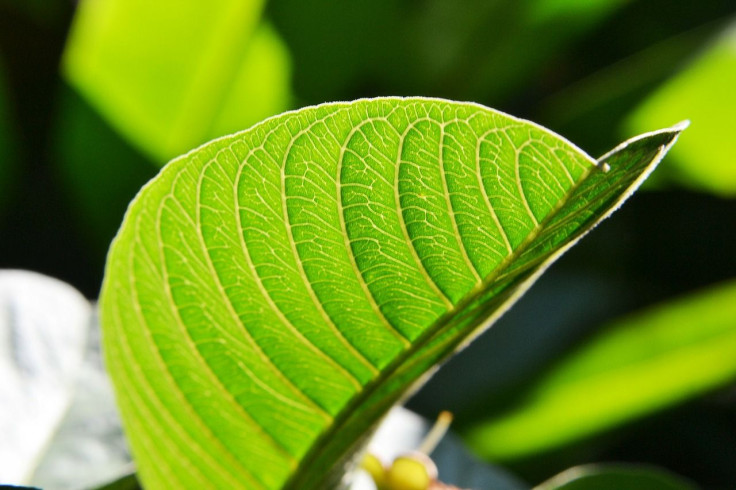6 Health Benefits Of Guava Leaves, From Treating Diarrhea To Cancer

Guava leaves are just as medicinally useful as the nutritional powerhouse fruit they grow with. The leaves of the guava tree are full of antioxidants, anti-inflammatory agents, antibacterials, and even tannins that can have significant health benefits, from treating stomach troubles to chronic diseases like cancer.
Just like the popular tropical fruit can be made into beverages, jams, and other foods, its leaves can too. They can be brewed to make a tea, for example, which releases beneficial substances like vitamin C and flavonoids like quercetin. Scientific studies have documented the healthful qualities of the superfruit’s leaves, and you can see what they’ve found for a variety of conditions below:
Diarrhea
Drinking guava leaf tea, taking its extract as a capsule, or adding a few drops of the essential oil to a cup of warm water can help loosen the bowels to treat diarrhea. In a 2008 study published in the Journal of Smooth Muscle Research, researchers sought to test the anti-diarrheal properties of guava leaves on rats. They found the extract was able to delay the onset of castor oil-induced diarrhea, decrease the frequency of defecation, and reduce the severity of diarrhea in the rats. This science merits the folkloric use of the plant as a natural remedy for managing and controlling diarrhea.
Obesity
While guava is high in fiber and has a low glycemic index, making it a useful supplement for weight loss, guava leaves and their extract can also help. They do this by inhibiting complex starches from converting into sugars. Typically, the sugar is metabolized by the liver where it gets turned into fat, and then secreted into the blood. This is what contributes to weight gain.
Diabetes
The high fiber content in guava can help manage diabetes by slowing down sugar absorption in the blood. But guava leaf extract can prevent type 2 diabetes from developing, according to a 2010 study published in the journal Nutrition and Metabolism. The study authors used guava leaf tea, which has been approved as one of the Foods for Specified Health Uses, and is now commercially available in Japan. This emphasizes the importance of how a commitment to managing blood sugar levels can prevent type 2 diabetes.
Dr. Revathi Sundaramurthy, a doctor for iCliniq.com, supports the use of guava for diabetics. “Guava has low glycemic index, even diabetic patients can consume guava, which prevents fluctuation in insulin and glucose levels” she told Medical Daily in an email.
High Cholesterol
Regularly taking guava leaf for months can help reduce LDL (bad) cholesterol and triglycerides without any side effects, according to the aforementioned 2010 study from Nutrition and Metabolism. Eating the fruit can also provide the same benefits as guava leaf, as it only has 0.1 grams of saturated fat and 0.2 grams of unsaturated fat, according to the USDA. With such low levels of this fat, it’s no wonder guava helps to reduce cholesterol.
Gastric Cancer
Guava leaf extract is so potent that it has the potential to treat patients with gastric (stomach) cancer. Its anticancer and antitumor properties come from compounds, like lycopene, quercetin, and vitamin C, which work as antioxidants to neutralize free-radical damage in the body. A 2011 study published in the journal Food Chemistry found that when the plant extract is consumed it leads to apoptosis, or gastric cancer cells attacking themselves.
Using guava in its essential oil form can also produce anticancer activity in the body. A 2006 study published in the journal Cancer Letters revealed guava essential oils could slow cancer activity in patients with stomach cancer, due in part to its rich concentration of nerolidiol, caryophyllene, beta bisabolene, p-selinene, aromandreno, tannins, beta sitosterol, leucocyanidins, and triterpenoids.
Prostate Cancer
Guava leaves’ high lycopene content is vital to fighting cancers, such as breast, prostate, and oral. Its cancer-fighting properties help inhibit the production of androgen, which is the male hormone responsible for the growth of cells in some types of prostate cancer, according to a 2012 study published in the journal Cancer Prevention Research.
Moreover, Sundaramurthy says the fruit is just as good at preventing cancer, and she attributes its effectiveness to its nutritional content.
“Guava rich in vitamin C, A, antioxidants, and lycopene helps in prevention of prostate and other types of cancers,” she told Medical Daily in an email.
Consult with your doctor before using guava as a substitute to treat these health conditions.
Recommended Guava leaves tea:




























